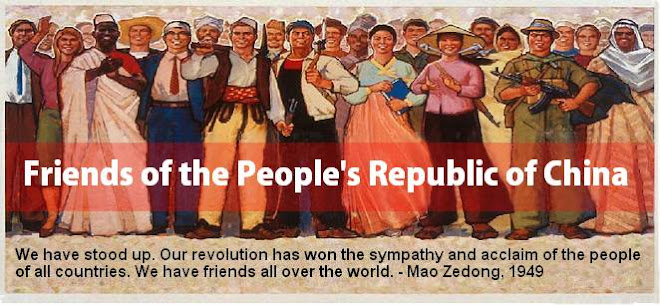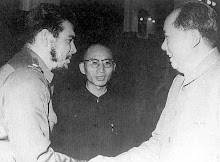Sino-African trade develops, 'west losing out'
Sukant Chandan,
Friends of China
It has been a long standing complain of some that China is dumping its cheap consumer goods into other nations of the Global South, including Africa, and in so doing it is negatively impacting those economies. What perhaps those who make these criticisms may not understand is that China is itself a young modern nation, only since 1949 has it become independent from colonialism and feudalism, and only really since the late 1970s has it had a stable internal economic situation so as to be able to focus on developing the country.
However much the west especially want to treat China like a 'developed country' so as to push it into situations where the west think then they can trip up and slap China down. China resists this pressure, and likes to remind people that it remains a country that is still at least three decades away from achieving a standard of living approaching anything to western levels.
If China was importing cheap goods and there was a massive problem with that, then it is primarily the duty of those recipient governments and consumers to decide otherwise. China has not broken any laws in exporting its cheap goods, and any country in a similar position would do the same. The days of cheap Chinese goods is developing into something else gradually, and China's trade relationship with Africa is also changing as the article from the paper of the British financial elites makes clear below, and changing in a win-win direction for both China and Africa.
Some western media is trying to educate some of its people that China is not at all only a producer of cheap counterfeited consumer goods, although this aspect is still there. China is fast becoming a exporter of affordable electronic goods, vehicles and machinery. The improving and developing trade between China and Africa is also in tandem with improving political relations: "Low prices undoubtedly help, but improvements in product quality and better co-operation between Chinese and African companies in tandem with political ties have also been crucial."
The west of course are the big losers. While the monpolised much of the economic relations with Africa for over a century in this period it ensured that Africa was the most exploited region in the world, and the west's continued policy to Africa is to do all that it can to ensure the continent cannot stand on its own two feet economically and militarily. Keeping Africa weak and divided was one of the main aims of nato's war on Libya, knocking out one of the pioneering nations in Africa that was contributing more than any other to a Pan-African economic political, economic and military strategy. The war saw China's investments and 130,000 Chinese workers flee Libya from nato attack. Ever since, China and Russia have said many a time that they were tricked over Libya, and that they wont fall for it again. For the sake of the whole Global South, one really hopes this is the case.
The article below states that it is countries like Britain, Spain, Germany and Italy who are the losers from China's improving trade and political ties to Africa. The west has tried to ensure that Africa remains without a industrial base, without basic national and continental infrastructure. Sino-Africa relations is revolutionising this situation and Africa can see a future where it will achieve a basic level of industry and growth to enable it to stand up for itself.
Africa's development is in mortal danger from the west who have stepped up their destabilisation strategies such as those in central Africa and in the Sahel, recolonisation (as in the case of Libya and sending troops to Uganda) and continued white supremacist media campaign, most infamously recently with the Kony2012 campaign.
South Africa, DRC, Zimbabwe, Algeria are some of the states which are priorities for the west to conduct regime change on, and all of these countries know it very well. Will Africa manage to accomplish a minimum level of development for its people and defend itself from western sabotage in the process? This depends in the final analysis of the level of unity and political will of Africa and its allies in Asia and Latin America. In the meantime, China is providing the pole of attraction if Africa wants to be treated with mutual respect; unlike the west, China provided a incomparable relationship of respect, China will not destabilise African nations, will not put sanctions on Africa, will not got to war with Africa, rather China is the facilitator to Africa standing up.
China moves up value chain in Africa
Financial Times
28 March 2012
When cheap Chinese goods started flowing in big numbers to Africa a decade ago, consumers benefited from lower prices, but local producers such as textile mills saw their businesses suffer.
Now, with Chinese companies moving up the value chain, that trade-off is changing. African consumers are still lapping up Chinese products, but these are more sophisticated. From smartphones to farm threshers, they are elbowing aside foreign, not local, competitors.
Chinese exporters have more than tripled their market share in Africa since 2002, supplying 16.8 per cent of the continent’s total imports last year, according to a report published this month by Standard Bank. Over the past four years Chinese companies recorded their biggest gains in selling machinery, vehicles and electronics.
European and Japanese companies have been the losers. African imports from Italy, Spain, Germany, Britain and Japan were all lower last year than they were in 2008. Meanwhile, imports from China surged 38 per cent over that same period.
This data “confirm some of the mature economy fears” that they are losing ground to Chinese exporters in Africa, Standard Bank economists Simon Freemantle and Jeremy Stevens say.
The success of Chinese companies is about more than being cheap. Low prices undoubtedly help, but improvements in product quality and better co-operation between Chinese and African companies in tandem with political ties have also been crucial.
The Ideos phone from Chinese electronics group Huawei is a prime example. Already billed as the world’s most affordable smartphone running Google’s Android system, it is subsidised in Kenya by Safaricom, a mobile network operator, to improve internet penetration.
At 8,000 Kenyan shillings – less than $100 – it is seven times cheaper than other similar smartphones.
“The features sell the phone,” says Martin Muraya, who owns a mobile phone stand in a chemist and has sold all his Ideos stock.
The Ideos was launched in 2010 and had a 45 per cent share of Kenya’s smartphone market less than a year later.
Shipments of Chinese goods to Africa have followed a path ploughed by Chinese money. Chinese companies have invested about $13bn in Africa, most since 2000, according to Standard Bank.
“It complements the competitiveness of Chinese firms in Africa,” the report says.
Zhenjiang Shenglong Machinery Manufacturing, a medium-sized maker of farming equipment in China’s Jiangsu province, gained exposure to Africa by contributing to aid missions.
“We were doing well in the Chinese market, but we realised that our products would die out domestically eventually. We had to break into other under-developed countries,” Luo Min, chairman of Zhenjiang Shenglong, says.
His company made about $3m in sales to Africa last year. For big purchases, Zhenjiang Shenglong sends trainers to teach farmers how to use and maintain the machines.
“Our competitors, some of which make better equipment, offer no training. No matter how good the machine is, without farmers knowing how to use it, it’s nothing but a waste,” Mr Luo says.
But even as Chinese companies fight to move up the value chain, the old guard of the country’s exporters – those making cheap and often shoddy goods – still cast a long shadow.
In Nairobi, Chinese-made goods fill market stands and shop shelves, but many are counterfeits, such as “Nokla” and “Sumsang” phones. So prolific are the imported fakes, locals give them the catch-all tag, “China phones”.
In One World Networks, an electronics shop in central Nairobi, staff say customers regularly return Chinese-made laptops and printers. Yet sales assistant Eunice says they have no choice but to keep buying them.
“The African market is Chinese. They help us because it’s the only one we can afford,” she says. “But they fail more. It works two days and fails the third.”





No comments:
Post a Comment